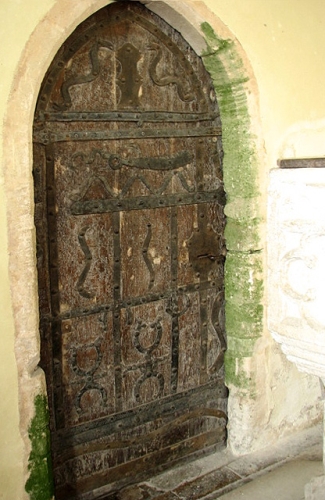 A great door is opened to me." - 1 Corinthians 16:9
A great door is opened to me." - 1 Corinthians 16:9 A great door is opened to me." - 1 Corinthians 16:9
A great door is opened to me." - 1 Corinthians 16:9
Twice in writing to the Corinthians, Saint Paul uses the same expression. Once he tells them of the lengthened stay he makes at Ephesus, "because a great door is opened to him." On another occasion (2 Corinthians 2:12) he mentions the disappointment he feels at being unable to avail himself of the opportunity of diffusing the Gospel at Troas where "a door was open to him in the Lord." In these expressions dropped unconsciously it is easy to recognize the apostle, a man who has only one thing at heart: to convey the Gospel of Christ to all men.
Whoever has any important object at heart is always watching for opportunities to advance it. The merchant is ever seeking for fresh openings to enlarge his trade. The lawyer, ambitious to rise in his profession, watches for cases in which, irrespective of pecuniary profit, he may find an occasion to display his powers. The aspirant to civic or political honors eagerly grasps every opportunity to win popular favor. And so the true messenger of Christ is ever watching for fresh openings to further the cause of the Gospel and the spiritual good of his fellow men, and ever prompt to detect them, prompt to avail himself of them, and to forget all else in the pursuit of what his heart is set upon. Such we find Saint Paul from the hour of his conversion to that of his death. Such were the men of God chosen in various ages to continue the work of the apostles. In all we notice the same singleness of purpose, the same readiness to avail themselves of every opening they could find for the work to which they had devoted their lives.
Every day when a priest awakes to his work and looks around him, how truly may he repeat the words of the Apostle: "A great door is open to me!" There are doors wide open every day and all day long: sinners not far from the Kingdom of God, ready in fact to yield to the first touch of a priestly hand; or souls careless in the performance of their duties and leading a life of lukewarmness, yet not ill-disposed, and only waiting for a little help to turn to a life of fervor; or, it may be, a whole generation of children, susceptible, if properly handled, of the happiest and most abiding impressions.
And then there are occasional openings, in regard to individuals or to certain classes, such as non-Catholics or unbelievers; circumstances especially favorable for the establishment of a confraternity, of an association for young people or for old, of some blessed devotion from which the happiest results may follow in due time.
The zealous priest is quick to notice such opportunities, and prompt to avail himself of them. Hence the striking difference between the fold he cultivates and that around him. In the one there is exuberant fertility; in the others, barrenness and decay. One would say that while the spiritual life accumulates in the former, it is slowly drained out of the latter. The careless, the indolent, the easy going priest fails to recognize such openings, or if he notices, he fails to study them, because he in stinctively fears that a closer knowledge of them would reveal possibilities such as to destroy the quietude he would fain continue to enjoy in his life of inaction and ease.
Am I alive to the interests of God, eager to advance them, ever watching for openings to do so, ever making the most of them when they come? The more they are availed of the more numerous and the more inviting are they. The saints met them at every turn of their daily life.
- from Daily Thoughts for Priests, by Father John Baptist Hogan, S.S., D,D., 1899; it has the Imprimatur of Archbishop John Joseph Williams, Archdiocese of Boston, Massachusetts